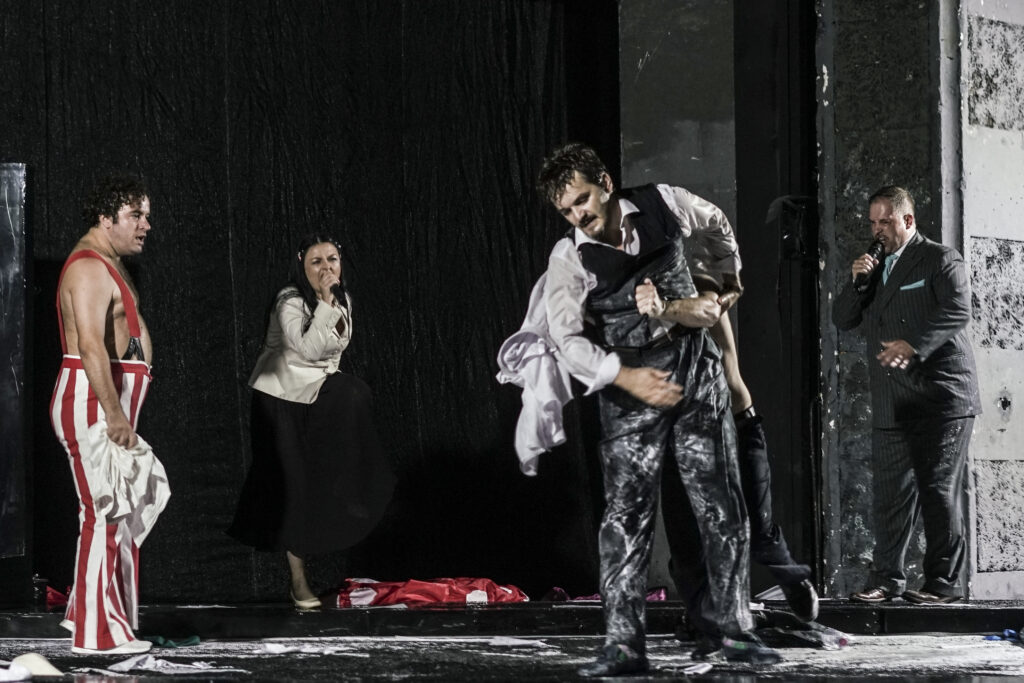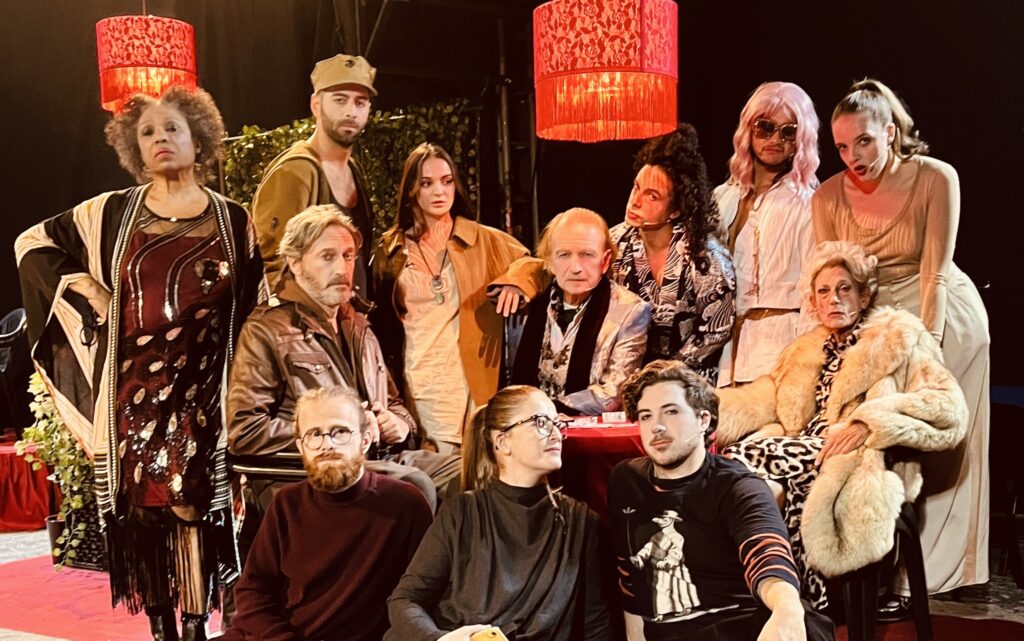Blerta Neziraj is one of Kosovo’s leading theatre directors. Verity Healey talks to her about the challenges of working as a female theatre director, the value of international collaboration and developing as an artist in a small country.
Blerta Neziraj is one of the most distinctive theatre artists in Kosovo. Her work is regularly presented internationally, in theatres across Europe as well as at the legendary La MaMa Theater in New York. Working regularly with her husband, the playwright Jeton Neziraj – on plays including In Five Seasons; An Enemy of the People, The Return of Karl May, a co-production with the Volksbuhne Theatre in Berlin and, most recently, on an ambitious international co-production of Balkan Bordello with LaMaMa – she also collaborates with other artists and theatres in the region.
Verity Healey: Why did you go into theatre?
Blerta Neziraj: I got into [theatre] in a round-about way. I wasn’t supported by my family to go into the arts, so I studied psychology in France instead. Then some years later, I met Jeton (and, soon after, he became my husband) and I began translating documents and seminars for his company Qendra Multimedia in Pristina, as well as coordinating various international projects.
This close contact with the Kosovo theatre scene prompted my decision to study directing. I don’t think Jeton was convinced by this move though, I think he thought I was only going through a phase. But directing became my vocation.
When I graduated the first big project I directed, supported by Qendra, was Jeton’s play Yue Madeleine Yue, about a Roma family who, after the war in Kosovo, is repatriated from Germany. This premiered at the Volkstheater in Vienna. Since then, most of my work has been connected to Qendra, although I often direct in other theatres as well.
Verity Healey: It seems there aren’t that many female directors in Kosovo?
Blerta Neziraj: I wouldn’t say there aren’t many female directors in Kosovo, but that not many are practising. Theatre in this country is a male arena, so, as a female director it isn’t that easy to remain active, you have to fight constantly and prove you are twice as a good as a man.

In Five Seasons: An Enemy of the People, directed by Blera Neziraj. Photo: Jetmir Idrizi
Verity Healey: How has your interest in different cultures and languages informed your work as a director?
Blerta Neziraj: Knowing many different languages means that you’re open to and have access to other cultures, you feel more secure when you are in other places as you understand what people are saying around you, you can be at home anywhere. In practical terms it helps my art because I have access to a wider range of literature and resources, and it also reduces lots of cultural barriers when working with international artists. We all feel good when we find other people who speak our language – somehow, we connect more easily. Of course, British and Americans do not have that feeling – they take it for granted, that everybody else has to know English.
Verity Healey: It’s something I’ve noticed in Kosovo, that people speak quite a few different languages…
Blerta Neziraj: Living in Kosovo feels a bit like living in a ghetto. We are land locked and also don’t have a lot of communication with the rest of the world. This is a big challenge for this newborn country. Young people are very much obliged to learn other languages in order to connect with the outside world, to understand what is happening abroad. Personally, that’s would I did. My parents were pushing me to learn as many languages as I could.
Verity Healey: Who are your main influences as a director?
Blerta Neziraj: Bob Wilson, Christoph Marthaler, Slobodan Unkovski (my former professor of directing), the great Pina Bausch to name a few. But I’ve only seen some of their works online. It’s not possible to access such important international theatre productions in Kosovo. You might ask, why I don’t travel to see their works? And the response is that I am a mother, and I am making theatre work here in Kosovo, and I am often on tour with my shows, so this doesn’t leave me much time to travel and enjoy shows around the world.
Verity Healey: Can it feel quite lonely? Are there opportunities to network with other female directors?
Blerta Neziraj: I do meet other female directors, but not with any specific goal. I do two or three shows yearly, that doesn’t leave me much time to be part of any women’s networks, or do any other kind or activism or networking! I am also quite an introvert and need time and space alone to recover from the burnouts that I get from the shows.
But I need to point out that Kosovo society is deeply patriarchal. Female directors definitely struggle, as do most of the women in this country. If you are a female director in theatre, you need to show your teeth little bit more than a male director normally would. You have to be authoritative otherwise you are not taken seriously! This isn’t easy, because as a woman you are expected to fail and you are seen as more vulnerable and so you have to invest time and energy in maintaining your position rather than throwing all that zeal at your art. Male directors also don’t seem to care about failing, no one seems to mind, not the media or the audience and they just go to the next projects. It is easier and more forgivable to fail if you are a man, but not if you are a woman. Women don’t tend to get second chances. That’s why I know I can’t afford to fail; I have to push more in every sense, in every direction.
There is another aspect I need to highlight: I do have a husband who is supportive and we’re both working in the same theatre company, but when it comes to the kids and the household, it’s mostly on my shoulders. We have a long road to travel to attain equality!
But we have a lot of brave women in Kosovo who are fighting to make great work in theatre and film. Many of these women have studied abroad in countries where gender equality has moved on quite far and of course they pass their knowledge and experience on when they return home. But I am not suggesting that such countries in Western Europe or the USA, where most go to study, are gender equality paradises! I’m aware that the struggle for women’s rights also goes on there.
Verity Healey : How do you develop as a director if it is hard to see other work?
Blerta Neziraj: Don’t get me wrong, I do see many shows per year, but not those from the directors I admire! To see work by Bob Wilson requires money and time and in most cases a travel visa. So I try to feed my imaginary world by reading, watching movies, travelling as much as I can afford – but mostly this is connected to my shows. Of course, I am also inspired by those people close to me in my life, people I meet in the street, politics. In most of my work I cooperate with other international artists, who come from different countries, and this exchange is very valuable for me.
Who knows, if I had the opportunity to see as many shows as I wanted then I might start limiting what I want to do onstage because somebody else has been doing the same. The way I enter the theater process is quite open and ‘pure’ in a way, as I do not have any burden of not trying to imitate one director…
Verity Healey: You’re not trapped by old ways of doing things…
Blerta Neziraj: I believe living in another country created in me a sense of not needing to be trapped in any one “home”, or in any one “culture” and not be chained to any “old way of doing things”, or to any “new way of doing things.” I simply do things in a way I believe they matter to me, in a way they talk to me.

Blerta Neziraj and the cast of Balkan Bordello. Photo: Ferdi Limani
Verity Healey: In Balkan Bordello you were working with actors and theater artists from the US and Serbia as well as Kosovo. How was the experience of integrating with other cultures and ways of working?
Blerta Neziraj: I wasn’t concerned that I had people coming from different cultures because a lot of my previous work had international casts – I was more challenged by having a cast of actors from different generations, some of whom had been on stage for about 50 years. And of course, this huge age difference (the youngest actress being around 25, and the oldest nearly 80), meant that I had to either choose to try and reconcile all the possible different approaches to their acting, or use those differences to make a point. Theoretically you can say that you, as a director, could impose your ideas onto everyone in the room, but I preferred here to find a way together by adapting to each other, by observing each other …this is what we do in the rehearsal room; we try. I wanted to have those acting “differences” integrated in to the “big pot” of the “bordello” we were cooking.
Verity Healey: Can you give me an example?
Blerta Neziraj: There is a scene in Balkan Bordello in which three characters are sitting at a table and having a ‘normal’ conversation. It’s not usual for me to have three actors sitting down having a “realistic” conversation for so long. Words are important, but I want to give the audience more than just words.
So, doing the scene in this way was scary at first, but then I started to be more relaxed and to trust the actors’ experiences and their potential. I thought to myself, I should accept this scene being like this. I started to feel that the show could make sense to the audience, if it were filled with similar moments like this one –- and not only with physical movement, songs, voices, dance and abstract scenes. However, this didn’t mean that Gjergj [Prevazi, Balkan Bordello’s choreographer[ agreed with me! But in the end, I used my authority – as a woman director – to make these decisions.
Verity Healey: Is there a message there about cultures and collaborating with each other?
Blerta Neziraj: In a way yes. Because what is trendy here, might not be somewhere else, what is old fashioned here, might not be somewhere else. So I did not want to set up some ‘common acting standards’, I relied mostly on the actors and the way they act in their home country And I wanted this to be visible to the audience in order to convey the message that compromises are needed, are important, if we want to understand each other.
Verity Healey: In Balkan Bordello, the character of Pylades, the boyfriend of Orestes, is portrayed as a dancer from Berlin who is trying to heal people’s experiences of war through dance.
Blerta Neziraj: Desmond Tutu said: “When the missionaries came to Africa they had the Bible and we had the land. They said “Let us pray.” We closed our eyes. When we opened them we had the Bible and they had the land.”
So, yes, we too, in post-war Kosovo, had many of those (Jeton calls them “humanitarian mercenaries” in one of his plays), who came to ‘heal’ our traumas, but went back home richer than they came. Many internationals who came to Kosovo treated the locals as if they were savages! They were ‘experts’ who were organizing workshops on how to brush your teeth, wash your hands and so on. Pylades is a character that represents the hypocrisy of many of those ‘experts’ that come from “civilized” nations, in order to teach and ‘civilize’ the others, the savages, in postwar zones.
Verity Healey: What do you look for in a play and what makes you challenge yourself as an artist?
Blerta Neziraj: If the topic of the play is new and political, then I am in. That is what makes me want to direct.
Jeton’s plays are very much connected to the political situation in the Balkans and in Europe. We can categorise them as political plays. And these are the types of plays I enjoy directing. I have been directing his plays for over 10 years now and I’m often jokingly told by friends to try other plays and get rid of Jeton – and I do, sometimes! But I feel safe with his work and in the type of “world’ he creates; full of irony and darkness. Because this is how our reality is: dark.
I also prefer to work with him because he makes changes to the text whenever I ask; he’ll add stuff or cut things to help me – so this collaboration works because we share the same sensibility on political issues, and can also collaborate practically as well. There are many couples out there in the world who are doing this kind of work together, and it works. It can get hard sometimes, but it works.
Further reading: Balkan Bordello – on the road with the Great Jones Repertory Company
Review of Blerta Neziraj’s A.Y.L.A.N at City Theatre Gjilan
Verity Healey is a writer and critic published by The Stage, Open Democracy, Howlround, British Council, Calvert Journal, with editorial commissions for Belarus Free Theatre. She is a contributing author to Routledge Companion to Contemporary European Theatre and Performance (pub 2022).








